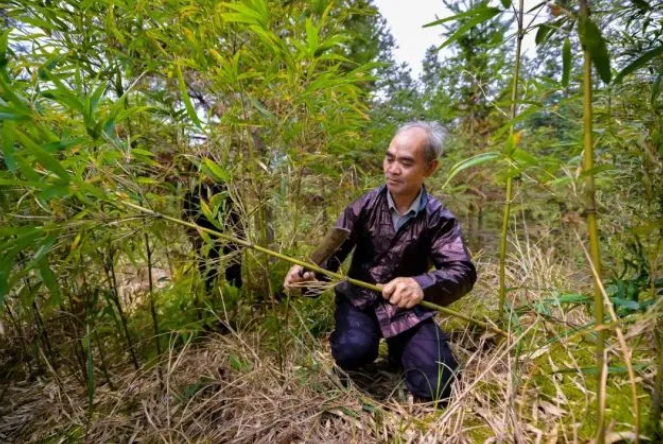Inherited intangible cultural heritage musical instruments in the deep mountains Lusheng
"Everything comes into Sheng song, and there are Sheng music everywhere", Lusheng is a traditional and ancient reed wind instrument of the Miao people, which has accompanied the Miao people through thousands of years of history.

In Aoli Village, Bingmei Town, Congjiang County, Qiandongnan Prefecture, there is an inheritor who has been making Lusheng for decades - Wu Laolang, now 59 years old.
In the mountains of Bingmei Town, Congjiang County, the trees are green, the breeze is breezy, and the breath of life is full of the mountains. When I first arrived in Aoli Village, I saw Wu Laolang dressed in national clothes, with a wood chopping knife hanging from his waist, and holding a bitter bamboo in his hand. It turned out that this was an important material that Wu Laolang collected from the bamboo forest early in the morning to prepare reeds. Wu Laolang is a native of the Miao ethnic group in Aoli Village. Because his family has made reeds for generations, Wu Laolang has been very interested in reeds since he was a child. Under the guidance of his father, Wu Laolang learned to make Lusheng little by little, and his skills became more and more exquisite. At the same time, Wu Laolang actively innovated on the basis of inheriting skills, so that the reeds he made were more accurate in pitch and more beautiful in shape than traditional reeds, and were deeply loved by local Miao compatriots. With the establishment of word of mouth, he also became a famous Lusheng master in Congjiang County.
Wu Laolang's family lives on a hillside in Aoli Village, surrounded by bamboo forests. On weekdays, he made reeds on the self-built platform on the first floor, and he was in a trance for decades. The production of reeds is composed of buckets, tubes, reeds and resonators. Every process from material selection to production, polishing, and decoration determines the sound of reeds and whether the sound is loud and pleasant. The funnel is made of pine or fir, cut in the middle, hollowed out and put into the funnel and then glued with glue. The bark or thin hoops are used externally for five laps to prevent cracking. Two rows of sheng pipes are inserted obliquely, and the sheng pipes are made of thin and long bitter bamboo, usually six pipes, but also four or eight pipes. The specifications of the reeds are different, the shorter one is 30 cm, and the older one can reach two to three meters. There is a section of the pipe that goes through the pipe, and the lower end is blocked. There is a sound hole at the upper end of the pipe, a sound hole near the pipe, and a copper reed inlaid at the entrance. The reeds in southeastern Guizhou have a bamboo resonator tube or a small funnel-shaped trumpet folded with bamboo slats at the sound hole at the upper end of the main pipe. When the reed is played, the thumb, index finger and middle finger of both hands press the left and right rows of pipe holes respectively, and the mouth contains a mouthpiece, which can be pronounced by blowing and sucking. Use the changes of breath and tongue tip to play a variety of vibrato and tremolo, with techniques such as hit, portamento, appoggiance, etc.

As he approached his sixtieth year, Wu Laolang passed on the traditional skill of making reeds to his son Wu Feifu. While learning skills, Wu Feifu paid attention to publicity. He and his father Wu Laolang displayed Lusheng works on the online platform, and explained the production story of Miao traditional musical instruments to netizens. Wu Laolang sighed: "Making reeds is a skill handed down from our ancestors, and every generation of us must adhere to this skill."

Nowadays, there are fewer and fewer artists like Wu Laolang who can skillfully make Lusheng, and there are few successors, and the traditional skills are in danger of being lost. As the government attaches great importance to, protects and utilizes the traditional Miao culture such as reeds and Miao flutes, and raises the popularity of Miao culture by holding national festivals, the local tourism industry can develop, and the living standards of the people are improving day by day. Legend has it, endlessly.
 渝公网安备 50010702504639号
渝公网安备 50010702504639号